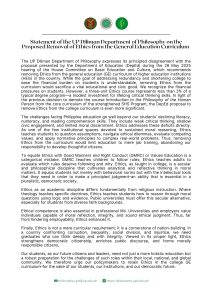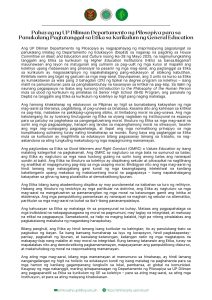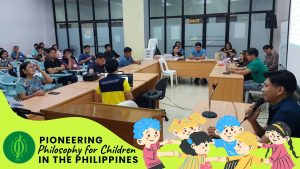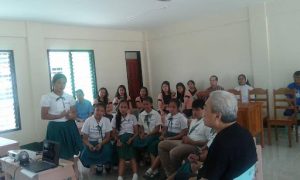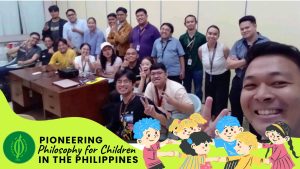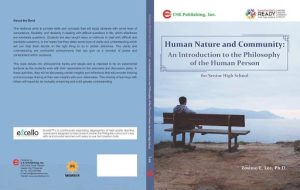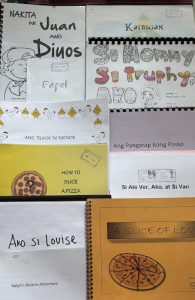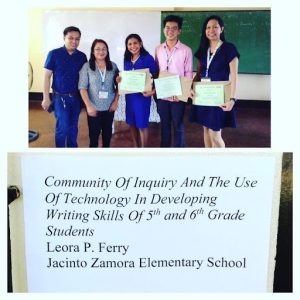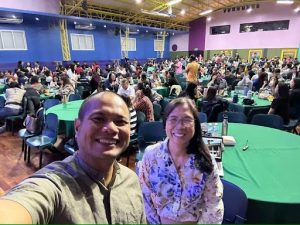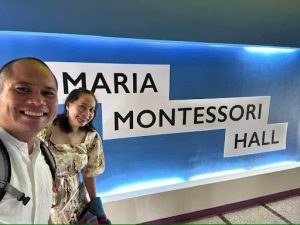Pahayag ng UP Diliman Departamento ng Pilosopiya para sa Panukalang Pagtatanggal sa Etika sa Kurikulum ng General Education
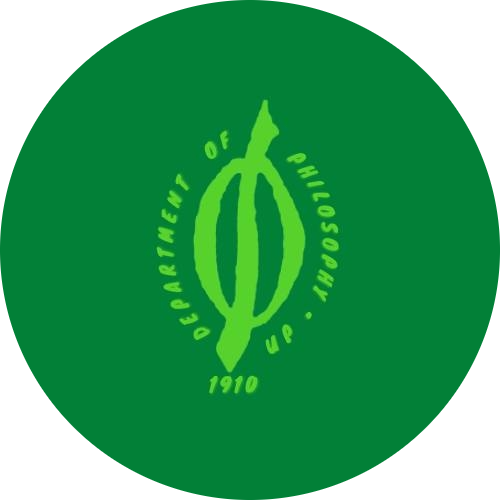
Ang UP Diliman Departamento ng Pilosopiya ay nagpapahayag ng maprinsipyong pagsalungat sa panukalang inilatag ng Departamento ng Edukasyon (DepEd) sa naganap na pagdinig sa House Committee on Basic and Education and Culture noong ika-28 ng Mayo 2025, na nagmumungkahing tanggalin ang Etika sa kurikulum ng Higher Education Institutions (HEIs) sa bansa. Bagama’t mauunawaan ang layon na matugunan ang suliranin sa pag-uulit ng mga kurso at mapaikli ang kolehiyo upang mabawasan ang pinansiyal na pasanin ng mga mag-aaral, ang pagtanggal sa Etika sa kurikulum ay magsasakripisyo ng napakahalagang pang-edukasyon at sibikong kabutihan. Kinikilala namin ang bigat ng gastusin sa mga mag-aaral. Gayunpaman, ang 3 units na kurso sa Etika ay kumakatawan sa wala pang 3 bahagdan (3%) ng tipikal na degree program sa kolehiyo – isang maliit na pamumuhunan para sa panghabambuhay na kasanayan sa kritikal na pag-iisip. Sa ilalim ng naunang pagpapasya na ibaba ang kursong Introduction to the Philosophy of the Human Person mula sa ubod ng kurikulum ng pinalakas na Senior High School (SHS) Program, ang panukala ng DepEd na tanggalin ang Etika sa kurikulum ng kolehiyo ay higit pang naging mahalaga.
Ang hamong kinakaharap ng edukasyon sa Pilipinas ay higit sa bumababang kakayahan ng mga mag-aaral sa literasiya, pagbibilang, at pag-unawa sa binabasa. Kasama dito ang kahinaan sa kritikal na pag-iisip, mababaw na pakikipag-ugnayang sibiko, at limitadong moral na pag-unawa. Ang mga kakulangang ito ay tuwirang tinutugunan ng Etika na siyang naglalaan ng institusyunal na espasyo para sa patuloy na paghahasa sa pangangatuwirang moral. Itinuturo ng Etika sa mga mag-aaral na suriin ang mga pagpapalagay, hanapin ang landas sa mapanghamong moral na sitwasyon, tasahin ang mga nag-uumpugang pagpapahalaga, at ilapat ang mga normatibong prinsipyo sa mga kumplikadong suliraning tunay nating kinakaharap sa mundo. Kung kaya ang pagtanggal sa Etika mula sa kurikulum ay maglilimita sa edukasyon bilang pagsasanay lamang sa trabaho, na nag-aabandona sa ating tungkuling makahubog ng mga mapagmuning mamamayan.
Ang pagtumbas sa Etika sa Good Manners and Right Conduct (GMRC) o Values Education ay isang malaking kategorikal na pagkakamali. Ang GMRC ay nagtuturo sa mga bata na sumunod sa batas; ang Etika ay nagtuturo sa mga nasa hustong gulang na suriin kung anong batas ang nararapat sundin at bakit. Ang Etika na itinuturo sa kolehiyo ay disiplinang sekular at pilosopikal na naglilinang ng analitikal at mapagmuning pag-iisip sa mga usaping moral. Binibigyan nito ang mga mag-aaral ng hindi lamang mga nakaugaliang gawi kundi ng mga kasangkapang intelektwal na kanilang kakailanganin upang makabuo ng makatuwirang moral na pagpapasya – isang napakahalagang kakayahan sa gitna ng isang pluralistiko at demokratikong lipunan.
Ang Etika bilang isang akademikong dispilina ay may pundamental na kaibahan sa turo ng relihiyon. Habang ang itinuturo ng teolohiya ay mga partikular na doktrina, ang Etika ay nagtuturo sa mga mag-aaral na mangatuwiran sa pamamangitan ng mga moral na katanungan gamit ang lohika at ebidensiya. Ang mga pampublikong pamantasan ay nararapat na maghain ng sekular na alternatibo, partikular sa mga mag-aaral na buhat sa iba’t-ibang pananampalataya.
Ang kahusayan sa Etika ay mahalaga rin sa propesyunal na buhay. Mataas ang pagpapahalaga sa mga indibidwal na nakapagsasagawa ng moral na pagmumuni, may taglay na integridad, at mahusay na etikal na pagpapasya. Samakatuwid, sa halip na maging balakid, higit pa nitong pinalalakas ang pagkakataong makakuha ng magandang hanapbuhay.
Bilang panghuli, ang Etika ay hindi lamang isang kurikular na kahingian; ito ay panulukang-bato sa pagbubuo ng bayan. Sa isang bansang humaharap sa isyu ng korapsyon, hindi pagkakapantay-pantay, pagkahati ng lipunan, at kawalang-katarungan, kailangan natin ng mga magtatapos na makapag-iisip nang malalim at may moral na integridad. Kung tamang tatanawin ang Etika, tunay na mapalalakas nito ang demokratikong pagkamamamayan, mapayayaman ang pampublikong diskurso, at makahuhubog ng moral na responsableng mamamayan.
Ang ating mga mag-aaral, bilang mga mamamayan at mamumuno sa hinaharap, ay hindi lamang nangangailangan ng higit na holistic na edukasyon kundi ng isang matatag na paghahanda para sa mga hamon ng kanilang gagampanang tungkulin sa lokal, pambansa, at global na komunidad. Kaugnay ng mga nabanggit, mariing ipinapanawagan ng Departamento ng Pilosopiya sa UP Diliman ang pagpapanatili sa Etika sa kurikulum ng GE sa kolehiyo – para sa ating mag-aaral, sa ating mga institusyon, at para sa ating malayang kinabukasan.
Statement of the UP Diliman Philosophy Department on the Proposed Removal of Ethics from the General Education Curriculum
The UP Diliman Department of Philosophy expresses its principled disagreement with the proposal presented by the Department of Education (DepEd) during the 28 May 2025 hearing of the House Committee on Basic Education and Culture, which recommends removing Ethics from the general education (GE) curriculum of higher education institutions (HEIs) in the country. While the goal of addressing redundancy and shortening college to ease the financial burden on students is understandable, removing Ethics from the curriculum would sacrifice a vital educational and civic good. We recognize the financial pressures on students. However, a three-unit Ethics course represents less than 3% of a typical degree program—a modest investment for lifelong critical thinking skills. In light of the previous decision to demote the course Introduction to the Philosophy of the Human Person from the core curriculum of the strengthened SHS Program, the DepEd proposal to remove Ethics from the college curriculum is even more significant.
The challenges facing Philippine education go well beyond our students’ declining literacy, numeracy, and reading comprehension skills. They include weak critical thinking, shallow civic engagement, and limited moral discernment. Ethics addresses these deficits directly. As one of the few institutional spaces devoted to sustained moral reasoning, Ethics teaches students to question assumptions, navigate ethical dilemmas, evaluate competing values, and apply normative principles to complex real-world problems. Thus, removing Ethics from the curriculum would limit education to mere job training, abandoning our responsibility to develop thoughtful citizens.
To equate Ethics with Good Manners and Right Conduct (GMRC) or Values Education is a categorical mistake. GMRC teaches children to follow rules; Ethics teaches adults to evaluate which rules deserve following and why. Ethics, as taught in college, is a secular and philosophical discipline that cultivates analytical and reflective thinking in moral matters. It equips students not merely with behavioral norms but with the intellectual tools that they need in order to make a principled judgment–an ability that is essential in a pluralistic, democratic society.
Ethics as an academic discipline differs fundamentally from religious instruction. Where theology teaches specific doctrines, Ethics teaches students how to reason through moral questions using logic and evidence. Public universities must offer this secular alternative, especially for students from diverse faith backgrounds.
Ethical competence is also essential in professional life. Universities and employers value individuals capable of moral reflection, integrity, and sound ethical judgment. Thus, far from hindering employability, Ethics enhances it.
Finally, Ethics is not a mere curricular requirement; it is a cornerstone of nation-building. In a country confronting corruption, inequality, social division, and injustice, we need graduates who can think deeply and with moral integrity. Viewed in its proper light, Ethics strengthens democratic citizenship, enriches public discourse, and forms morally responsible citizens.
Our students, as our future citizens and leaders, need, not just a more holistic education but a robust preparation for the challenges of such roles within their local, national and global community. We therefore urge our policymakers to retain Ethics in the college GE curriculum–for the sake of our students, our institutions, and our democratic future.
Pioneering Philosophy for Children in the Philippines


Figure 1: Training workshop at Leyte Normal University.
Philosophy for Children is an educational movement which started in the late 1960s when Matthew Lipman was still in Columbia. It focuses on the idea of the classroom as a community of inquiry (COI). In the 70s, Lipman met Ann Margaret Sharp in Montclair State University and together they developed university-level programs in P4C.
Back in 1990, while Prof. Zosimo Lee was finishing his PhD in the State University of New York at Buffalo (Suny Buffalo), he chanced upon a leaflet on Philosophy for Children (P4C), which came from the Institute for the Advancement of Philosophy for Children (IAPC) at Montclair State University, New Jersey.
“On hindsight, it seems that my work in Philo for Children was really in consonance with what I already started in my doctoral dissertation involving rational conflict resolution and somehow the work with Philosophy for Children became in sync,” Lee narrates.
Dr. Lee is referring to how his research centered on themes involving the notions of “rational conflict resolution, peace building, being able to deal with different perspectives, and the role of philosophy in providing that kind of understanding which Rawls calls public reason.” He even wrote an article on the creation of public reason wherein he compared Rawls’ perspective with Habermas’ perspective and linked it with the role of the community of inquiry by Matthew Lipman.
Having met both Matthew Lipman and Ann Margaret Sharp who were the pioneers of P4C and Community of Inquiry (COI) in a conference in 1996 helped Dr. Lee appreciate even more the importance of a dialogical community. After the conference, Lipman published Dr. Lee’s article on communicative inquiry in the journal, Thinking.
After said conference, Dr. Lee incorporated what he learned in his own classes, and it led to projects wherein he taught P4C as a pedagogical tool to public elementary school teachers. Philosophy colleagues, Asst. Prof. Renato Manaloto, Dr. Napoleon Mabaquiao, Atty. Darlene Berberabe-Lim, Atty. Eric Vera, Asst. Prof. Isidro Manuel Valero, as well as the late Dr. Silvino Epistola and Dr. Leonardo De Castro joined him.
Dr. Lee used the method of communicative inquiry to grade school students and the learning agenda came from students. He diligently made the rounds in different districts in the public schools of Manila between the years of 1997-1999. These weekly sessions truly helped public school teachers who now had a new pedagogical tool to use. Because of this experience, Dr. Lee was able to see how to implement a training program using the methodology of the COI. Most importantly, how to use this innovative tool within the Department of Education curriculum.

Figure 2: Session in Leyte with grade school students
Building a Community of Inquiry
Dr. Lee fondly remembers one instance.
“In P. Gomez (school), I facilitated a Grade 6 class. The discussion came to the question, ‘What is the difference between the mind and the brain?’ The students were so good at furnishing ideas and giving examples. They were so articulate that I felt that the students were already getting ahead of the teacher and the teacher was the one who was trying to catch up. But that just shows that when the students feel talk about their own ideas and share their own thoughts, they really become free… They own their own learning.”
In 2000, Dr. Lee returned to the IAPC in Mendham, New Jersey. He says, “It further deepened what I learned from the first seminar and reinforced some of the hypothesis in the training programs that I was conducting.” He then became a long-standing member of the screening committee for the writing awards of the International Council of Philosophical Inquiry with Children. He also presented a paper in a council meeting of practitioners of P4C from all over the world in Winchester, England. He was at the UNESCO meeting in Paris when UNESCO adopted P4C as an educational practice.
He continued to teach P4C in his undergraduate and graduate courses even as he juggled it with his leadership role as Dean of the College of Social Sciences and Philosophy in UP Diliman. In 2012, he continued his work in training public school teachers and principals in and around Manila, especially in Tondo, who were introduced to the community of inquiry. The Center for Excellence in Public Education (CENTEX) in Tondo, Manila, and Bauan Batangas adopted the COI in their teaching and these trained teachers were also the ones that provided the facilitation during the training programs in Negros and Cagayan de Oro with the help of Ayala Foundation. This worthwhile endeavor was further expanded to provinces outside Manila.
Dr. Lee clarifies, “What does the COI do? Because you shift the generation of the learning agenda from the teacher to the students, the students take more initiative in their own learning process. And it starts with asking questions. Kasi isa sa mga nawawala sa mga bata eventually, if it is not encouraged, is the asking of questions. Children when they were very young ask a lot of questions. And the questions of children at 2-3 years are the most profound philosophical questions you could ever find.”
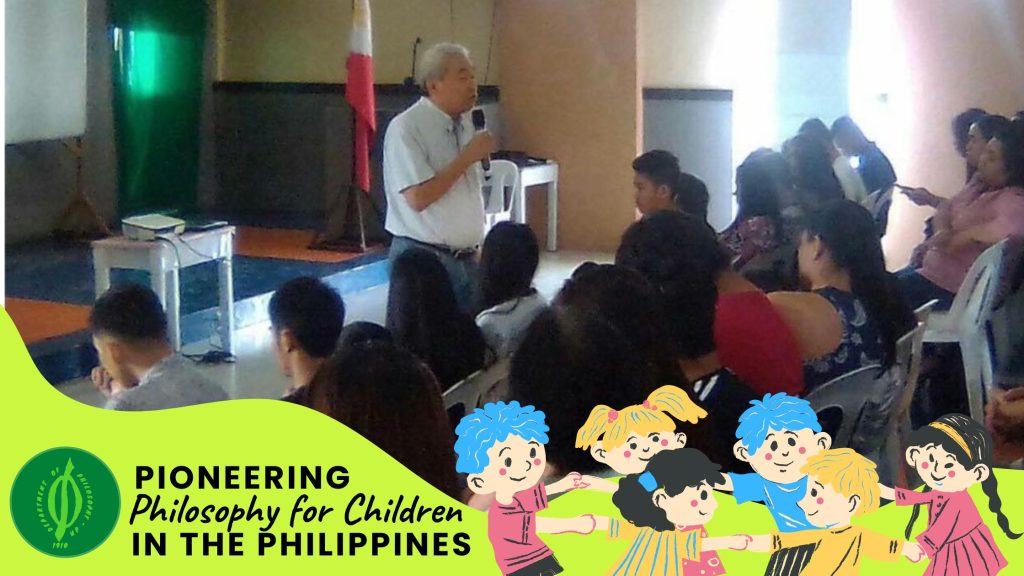
Figure 3: Giving a talk to parents In Urdaneta, Pangasinan about P4C
He further adds that one of the most important things to do during these workshops is to rekindle the teachers’ curiosity as well to arouse their questioning ability and their own sense of wonder. With his experience and knowledge, Dr. Lee has developed his own format and has even incorporated the Filipino perspective in his method, making the tool even more effective in the context of Philippine education. He emphasizes that
“… the whole point of the community of inquiry is really to focus on the thinking process. Because it is through and in the thinking process, the learning occurs. The students learn to think for themselves, to value their own thinking. They get to generate their own criteria to when they can say to themselves that they are thinking better. And this is done together with others so that the learning process is collective, and it is shared. There is also self-correction.” Both students and teachers share this experience of “building criteria for better reasoning”.
Dr. Lee considers the culmination of his lifelong work in a 2016 project done with UNESCO at Ateneo de Manila University, wherein participants from other countries such as South Korea and Myanmar joined. Grade 6 students, Filipino children who benefitted from previous workshops, impressively demonstrated the community of inquiry to the participants by conducting their own philosophical discussions. One professor from Myanmar even said that they want their children to be able to do what they witnessed.
P4C in the Philippines Now
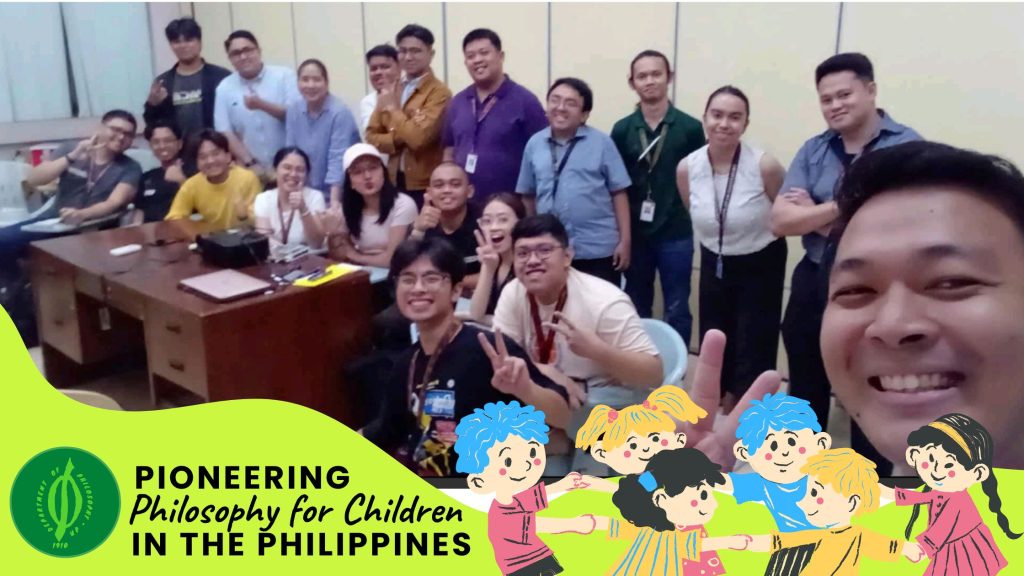
Figure 4: Second Semester AY 2024-2025 Philo 298 (Philosophy for/with Children) graduate students under Dr. Ma. Theresa Payongayong pose with undergraduate students after a P4C session on 19 May 2025.
Dr. Lee’s P4C legacy endures even after his retirement from academic life. Not only has it reverberated in the public school system who directly learned from him, his colleagues from the Department of Philosophy in UP Diliman continues to train teachers and students to further propagate P4C and the community of inquiry. Dr. Ma. Theresa Payongayong attributes to Dr. Lee her introduction to P4C. She shares,
“While I have been involved in various P4C trainings, seminars, workshops and other P4C-related activities over the past 25 years, I hold Dr. Zosimo E. Lee in high regard as the pioneer in P4C. I appreciate his invitation for me to participate in P4C mainstreaming efforts among public and private basic education teachers. My interest in P4C was sparked by the realization that it has the potential to catalyze meaningful change and improve the education system.”
Dr. Payongayong considers her initiative to offer P4C classes at both the undergraduate and graduate levels a pioneering effort. As part of this, she provided students with the opportunity to engage in actual P4C sessions with grade school and high school students from both public and private schools. Some of her students participated in sessions in Bulacan, Batangas, Marikina, Manila, and even at our own UPIS. In 2005, she also learned directly from Matthew Lipman and Ann Margaret Sharp through the IAPC Training Workshop. She was the only Filipino participant at that time.
A group of faculty members from the department led by Dr. Jeanette Yasol-Naval conducted a teachers’ training for the subject, Introduction to the Philosophy of the Human Person and P4C sessions were held as a culminating activity. In partnership with DepEd Division of Nueva Ecija from 25-27 July 2018 and 19-21 June 2019, over a hundred teachers were introduced to the pedagogy. The group consisted of Dr. Payongayong, Dr. KC Abalos-Orendain, Asst. Profs. Symel de Guzman, Arlyn Macapinlac, and Romulo Bañares.

Figure 5: Above are UP instructor Gavin Chuacuco and OB Montessori coordinator Ms. Sarah Adap and another OB Montessori teacher.
Dr. Lumberto Mendoza also continues Dr. Lee’s legacy. He conducted a face-to-face training workshop on the use of Community of Inquiry for teaching in OB Montessori School, San Juan. He has given similar workshops online as well. This was in 2020 with Minadanao State University in General Santos City. He worked with junior faculty members such as Mr. Gavin Nigel Chuacuco, Ms. Aleli M Caraan, and Asst. Professor Marielle Antoinette Hermoso Zosa, ensuring that these techniques will be passed on to the next generation of facilitators.
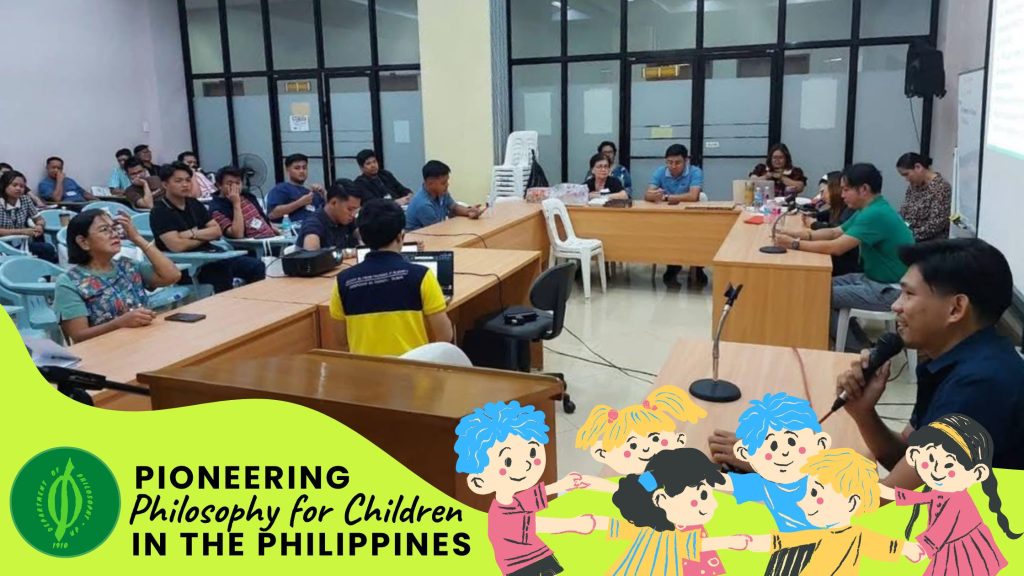
Figure 6: CSSP Extramural Training “Reclaiming the Self: The Role of Philosophy in Navigating Challenges in Research”
Most recently, COI was used by Inst. Gavin Chuacuco, Inst. Patrick Joshua Villegas, Asst. Prof. Symel Noelin de Guzman-Daulat, Asst. Prof. Macapinlac, Dr. Lily Beth Centeno-Lumagbas, and Dr. Ma. Theresa Payongayong in the CSSP Extramural Training Seminar for Social Science Teachers with the theme, “Ethics, Artificial Intelligence, and Knowledge Production.” The department led the workshop entitled “Reclaiming the Self: The Role of Philosophy in Navigating Challenges in Research” was a mix of lectures and a community of inquiry.
Indeed, the Department of Philosophy in UP Diliman continues to propagate and develop P4C, especially in light of the inclusion of the course, Introduction to the Philosophy of the Human Person in the Kto12 Program of the Department of Education. Because of this commitment, six of the senior faculty members of the leading analytic philosophy school in the country will participate in the 2025 Summer Program of the Institute for the Advancement of Philosophy for Children (IAPC) in Montclair State University in New Jersey. Dr. Payongayong, who is currently the Assistant Vice President for Academic Affairs (Curriculum and Instruction) for the UP System will attend the IAPC course once again and she will be joined by Department Chair, Dr. Liza Ocampo as well as Dr. KC Abalos-Orendain, Dr. Lily Beth Centeno-Lumagbas, Asst. Prof. Arlyn Macapinlac, and Dr. Jeanette Yasol-Naval. Through these efforts, the department endeavors to establish a P4C Center soon.
Written by Dr. Karen Connie Abalos-Orendain
Photos and Captions by Dr. Zosimo Lee, Dr. Ma. Theresa Payongayong, Dr. Lumberto Mendoza, and Asst. Prof. Arlyn Macapinlac
Check out more photos of P4C activities facilitated by faculty and students of the UPD Department of Philosophy.

